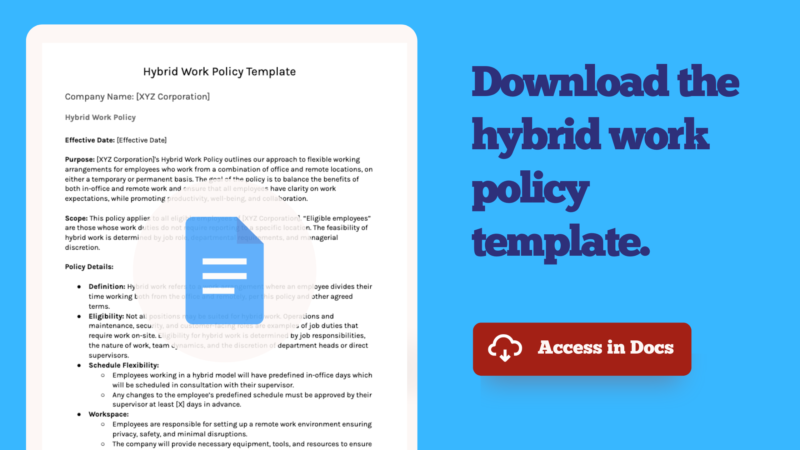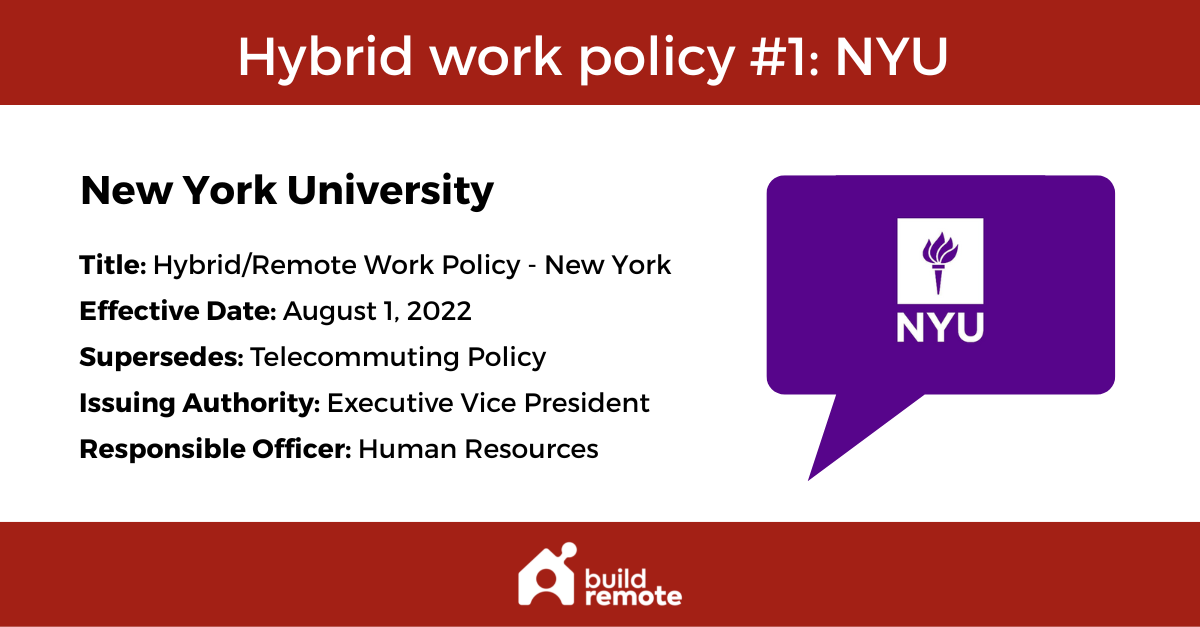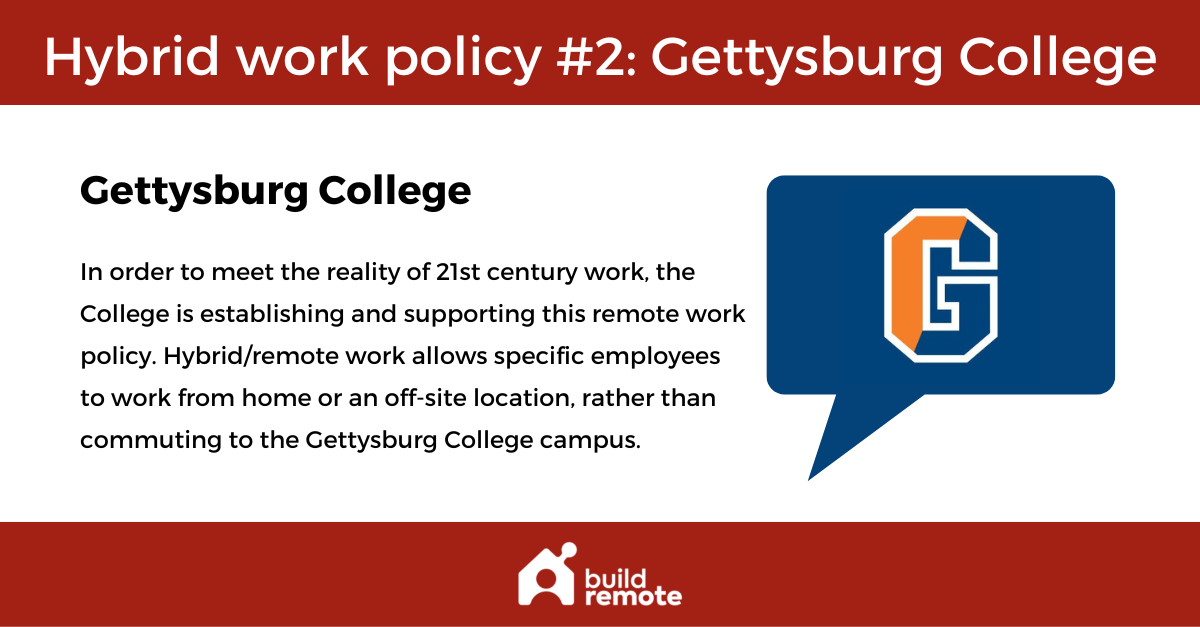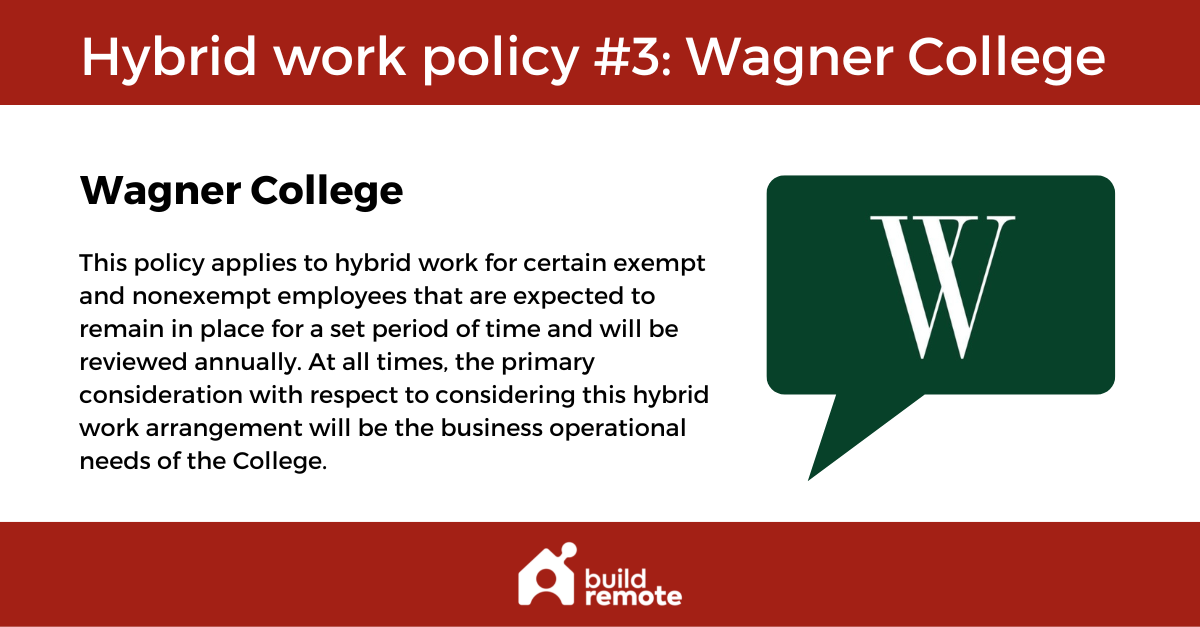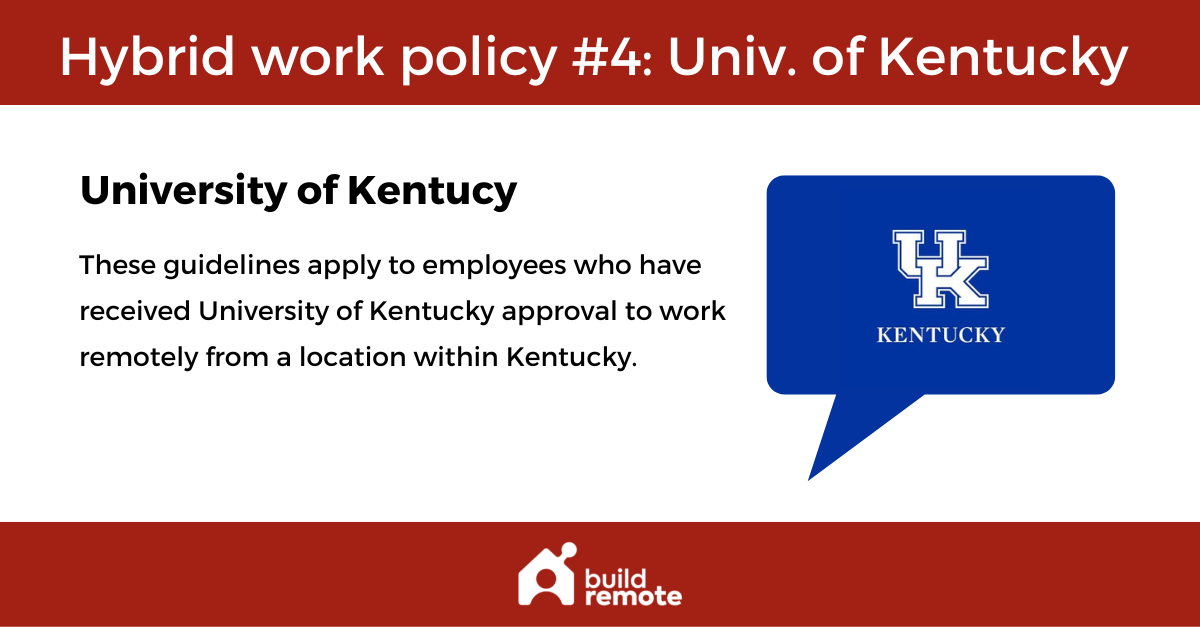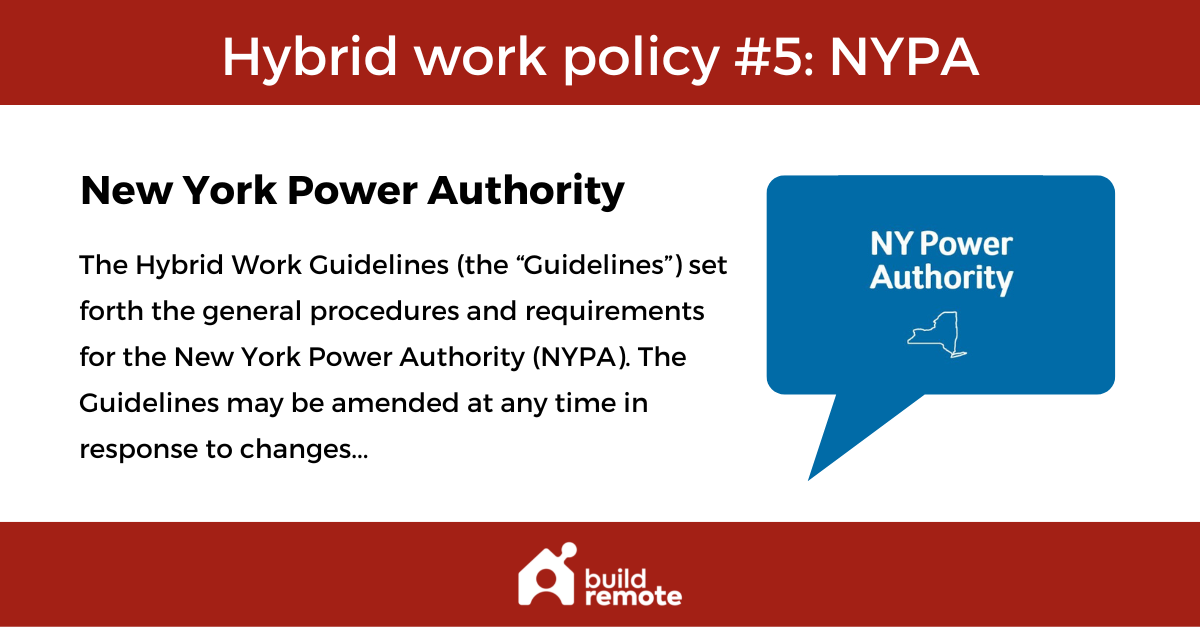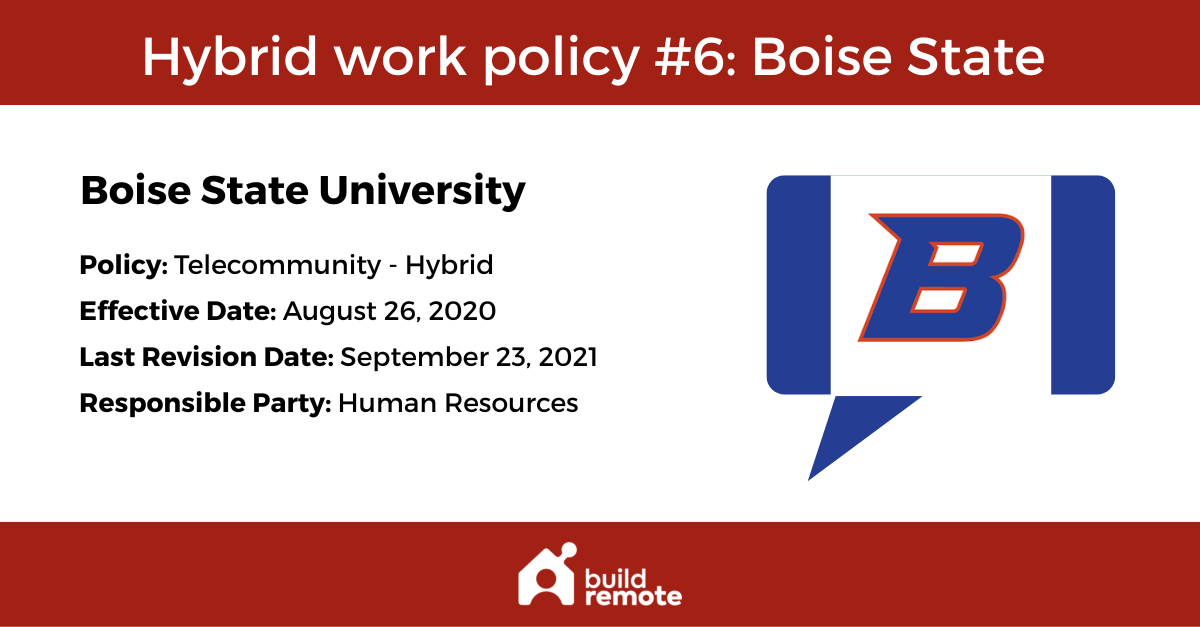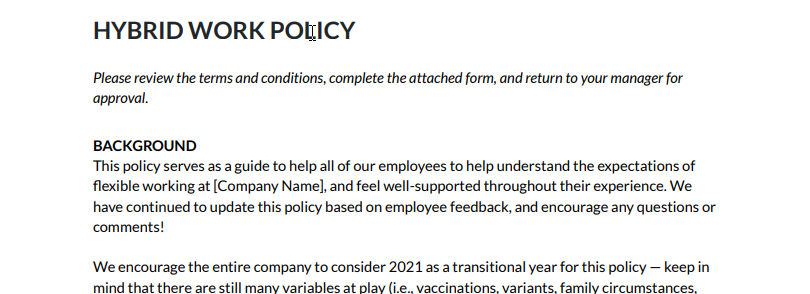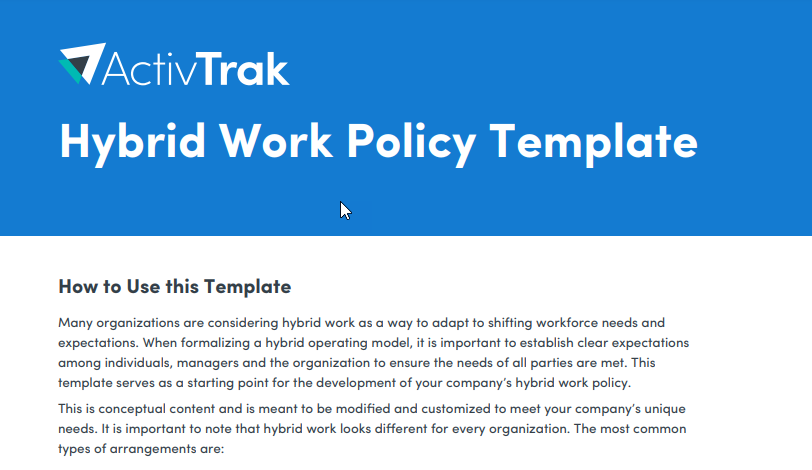Hybrid Work Policy Template (+ Real Policies Analyzed)

Here is a hybrid work policy template you can customize in Google Docs. Edit the text, input your company and policies, and download the document in Word or as a PDF.
There’s no question that hybrid work is having a moment. Because it balances working in-office with working at home, it is an attractive alternative for companies that want to be more flexible in their scheduling but are unwilling or perhaps unable to fully commit to going remote.
But while many organizations are interested in shifting to a hybrid model, they may not know exactly how to develop or implement it.
We studied real hybrid work policies of six organizations to see what they included. Below, we’ve included links to these policies so you can take a look; we’ve also added takeaways from each. You’ll also find three general hybrid work policy templates at the very bottom to help guide you through crafting your own. After our research, we created our own hybrid work policy template you can customize and take with you.
Use the links below to jump to a section that interests you.
- Hybrid policy template
- Free download of the template
- Real hybrid work policies
- Hybrid policy templates
Hybrid Work Policy Template
Disclaimer: This template is not legal advice. Please advise your HR or legal team first to determine the right language and structure of your policy depending on your type of organization, employee status, and labor laws in your state or country.
Company Name: [XYZ Corporation]Hybrid Work Policy
Effective Date: [Effective Date] Purpose: [XYZ Corporation]‘s Hybrid Work Policy outlines our approach to flexible working arrangements for employees who work from a combination of office and remote locations, on either a temporary or permanent basis. The goal of the policy is to balance the benefits of both in-office and remote work and ensure that all employees have clarity on work expectations, while promoting productivity, well-being, and collaboration. Scope: This policy applies to all eligible employees of [XYZ Corporation]. “Eligible employees” are those whose work duties do not require reporting to a specific location. The feasibility of hybrid work is determined by job role, departmental requirements, and managerial discretion. Policy Details
Procedure for Hybrid Work Request
Conclusion: [XYZ Corporation] is committed to fostering an environment that encourages productivity and employee satisfaction. We believe that a hybrid work model, when executed well, can be a significant asset to our team. However, regular feedback and open communication will be key to ensuring its success. Policy Review Date: [Date, e.g., “January 1, 2024”] This policy is subject to change, depending on evolving business needs and feedback. |
Download The Policy Template
Want to make this hybrid work policy template your own? Access the template in Google Docs or Word.
Real Hybrid Work Policies
We’ve compiled six hybrid work policy samples and highlighted key points you can take away from each. Many of the policies are from colleges and universities, which we found interesting. This article goes into more detail about why higher education may be so quick to embrace a hybrid model, including the interesting suggestion that they’re trying to future-proof themselves against further trouble that may interrupt in-school learning.
New York University’s hybrid work policy
Sections Included:
- Statement of policy
- To whom the policy applies
- Definitions
- Hybrid/remote classification structure
- General considerations for hybrid/remote work approval
- Guidelines for approval of hybrid/remote work
- Positions classified as mostly remote or positions performed from another state outside of the NYC Tri-State Area
- Other considerations
- Management and continued approval of hybrid/remote work
- Equipment required for hybrid/remote work – employee provided
- Equipment failure
- Occupational injuries with hybrid/remote work
Policy Statement:
This Policy establishes guidelines for Hybrid/Remote Work for covered employees of New York University in New York (hereinafter, “NYU” or “the University”) and supersedes the Telecommuting Policy.
| Main takeaway
NYU’s policy includes a section describing what equipment and technology the school will provide, and to which employees. If you’re creating a hybrid policy for your company, make sure it details the necessary equipment and how that equipment will be maintained. |
Gettysburg College’s hybrid and remote policy
Sections Included:
- Types of work arrangements
- Eligibility
- Request and approval
- Employee responsibilities
- Safeguarding of confidential information
- In-home interruptions/dependent care
- Remote work agreement
Policy Statement:
Recognized as “a great place to work” by The Chronicle of Higher Education, ensuring the Gettysburg College employee work environment remains supportive, flexible, and equitable for all employees is an institutional priority. In order to meet the reality of 21st-century work, the College is establishing and supporting this remote work policy.
| Main takeaway
During the pandemic, we learned that working from home can bring its own flavor of interruption — in the form of kids, pets, and sometimes noise from neighbors. To that end, Gettysburg’s policy includes guidelines designed to minimize in-home interruptions. If you’re concerned that your employees may be chasing after their dog when they should be working, consider covering interruptions in your hybrid work policy. |
Wagner College’s hybrid policy sample
Sections Included:
- Purpose and scope
- Definitions
- Hybrid work arrangement policy statement
- Positions and employees eligible for hybrid work arrangement
- General expectations and conditions
- Request for hybrid work arrangement
- Equipment and materials
- Liability
- Modification or termination of alternative work arrangement
- Travel expenses
- Assistance with this policy
- Policy authority
Policy Statement:
In accordance with the guidelines set forth in this Hybrid Work Arrangement Policy, the purpose of this policy is to describe the hybrid work arrangement that may be available to certain employees in appropriate circumstances. This policy applies to hybrid work for certain exempt and nonexempt employees that are expected to remain in place for a set period of time and will be reviewed annually.
| Main takeaway
An issue many companies grapple with when designing hybrid schedules is deciding who qualifies to work remotely. Wagner provides a robust “criteria consideration” plan to identify which employees can work from home — as well as how to measure their productivity and renew and/or reduce their hybrid status over time. |
University of Kentucky’s policy
Sections Included:
- Scope
- Definitions
- Remote work agreement
- General expectations and conditions
- Furniture, equipment, and supplies
- Internet and other costs
- Data protection and information security
- Safety
Policy Statement:
These interim guidelines shall be effective beginning July 1, 2021. As President Eli Capilouto communicated to the university on June 10, 2022, these guidelines remain in place as a Work Location Workgroup continues researching and exploring ideas as well as providing recommendations on how work location can support our institutional mission and efforts to advance the state.
| Main takeaway
The nature of hybrid work often means some employees are on-site while others are at home. What do you do if your primary work site is closed, though? The University of Kentucky dedicates a section of its hybrid work policy to outlining how operations will continue in the event of an emergency closing. In a nutshell, those who are already scheduled to work remotely are expected to continue working as usual, while those who were scheduled to be on-site may receive Emergency Closing compensation. If you’re concerned about site closures or live in an area prone to natural disasters (floods, fires, and so on), you may wish to include this in your policy. University of Kentucky’s policy also includes a professionalism policy outlining how hybrid employees are expected to behave while remote, which may be useful if you are concerned about decorum standards slipping. |
New York Power Authority’s hybrid policy
Sections Included:
- Overview
- Definitions
- Eligibility
- Remote working requirements
- Flexible schedules
- Performance and productivity oversight
- Reasonable accommodations
- Equipment
- Contingent workers and consultants
- Health and safety
Policy Statement:
1.1. The Hybrid Work Guidelines (the “Guidelines”) set forth the general procedures and requirements for the New York Power Authority (NYPA).
1.2. The Guidelines may be amended at any time in response to changes in relevant health and safety guidance from federal, state, and local authorities and in response to business needs.
1.3. The period through which employees may be eligible to work remotely will extend until further notice, when the remote program will be reviewed.
| Main takeaway
Proper scheduling is critical to a successful hybrid workplace — but schedules are often interrupted by life and holidays. New York Power Authority’s policy lays out a plan to manage unexpected schedule changes. If, for example, a hybrid worker’s on-site day falls on a holiday or some other conflict, they may have to work on-site during the pay period to make up for it. When designing your hybrid work policy, consider scheduling challenges that may come up and have a plan in place to meet them. |
Boise State University’s policy
Sections Included:
- Scope and audience
- Policy purpose
- Policy statement
- Definitions
- General expectations
- Eligibility
- Annual telecommuting-hybrid agreement
- American With Disabilities Act (ADA) reasonable accommodation
- Alternative worksite safety
- Commute time and paid travel
- Workplace environment
- Information technology security, equipment, and other costs
- Outside employment
- Liability and workers’ compensation insurance
- Resident taxing for states outside of Idaho
- Other federal and state laws
- Discontinuing a telecommuting-hybrid agreement
- Return of university property
- Costs, damages, or lost property
- Forms
Policy Statement:
This policy applies to all Telecommuting-Hybrid requests for a Classified or Professional Employee to work at an Alternate Work Location for a specified number of hours or days per week.
| Main takeaway
A common stance against hybrid and remote work has been the possibility that employees will take on additional forms of employment and work for another on company time. Boise State anticipated this and has created a conflict of interest policy that all hybrid workers must follow. Companies that want to make sure their staff is focused on work at all times — or at least won’t be trying to juggle two jobs — might consider adding such a guideline to their own hybrid work policies. |
Hybrid Work Policy Templates
Now that you’ve seen hybrid work policies in action, you may be ready to start working on your own. We’ve got you covered there, too — we sourced hybrid work policy templates from several companies. They provide a general structure for you to follow, as well as details to keep in mind while you craft your policy.
Workshop’s hybrid work policy template
Sections Included:
- Background
- Definitions
- Who is eligible for hybrid and remote work
- Working hours, attendance, and availability
- Communication
- Environment
- Performance expectations
- Equipment
- Stipend
- Security and confidentiality
- Other
- Termination of agreement
- Work agreement
Policy statement:
This policy serves as a guide to help all of our employees to help understand the expectations of flexible working at [Company Name], and feel well-supported throughout their experience. We have continued to update this policy based on employee feedback, and encourage any questions or comments!
| Main takeaway
While the policies above describe what roles may be able to go hybrid, Workshop’s template outlines what criteria will impact the decision. It also tries to get ahead of the communication issues that can come with a remote or hybrid team, adding that everyone should “err on the side of over-communication.” |
Indeed’s hybrid & remote work policy template
Sections included:
- Purpose and scope
- Eligible positions and employees
- Remote work expectations
- Legal considerations for hourly remote employees
- Remote tools, equipment and supplies
- Technical support options
- Guidelines for setting up employee work environments
- Security and confidentiality rules
- Any required travel
- Salary and pay
- Consequences
Policy statement:
This remote work policy establishes guidelines for employees who work from a location other than our (office, building, worksite, etc.). Remote work can (list of benefits remote work will bring to your business — e.g., improve productivity, reduce office and parking space, reduce traffic congestion, enhance work/life balance, protect the health and safety of employees during COVID-19).
| Main takeaway
Indeed’s hybrid work policy template has a substantial section on the legalities your company needs to consider before building and executing a policy. It also addresses the socialization that so many workers valued in the office — and how to keep that socialization going in online channels. |
Activtrak’s Hybrid Policy Template
Sections Included:
- Policy overview
- Company policy and eligibility
- Specific terms
- Resources for remote employees
Policy Statement:
Our hybrid work policy outlines guidelines for employees who work from a combination of in-office and remote locations, either on a permanent or temporary basis. The purpose of this policy document is to clearly define expectations to ensure that both employees and [our company] will benefit from this hybrid work arrangement.
| Main takeaway
ActivTrak’s template includes a valuable section: a link to resources for all remote workers. Employees working off-site can review the company’s handbook, social media guidelines, internet usage guidelines, monitoring policies, and much more all in one place. This is the sort of offering that can fall between the cracks as companies try to put together remote and hybrid policies. |
Ultimately, your hybrid policy will depend on your company’s specific needs. You can learn more about the different types of hybrid schedules in this post or educate yourself further on the differences between fully remote and hybrid work.
Hybrid Work Model: The Complete Overview
|

